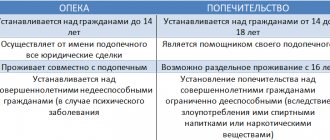In order to become an adoptive parent, you must meet a number of requirements established by the Family Code and other regulations. One of these conditions is the minimum age difference between the adoptive parent and the adopted child. Often the adoption process is accompanied by difficulties and problems. The time between submitting an application to the guardianship authorities and the appearance of the baby in the house can be very long. However, after all the issues are resolved, the baby acquires parents and begins a new life in a full-fledged family.
Criteria for applicants to adopt a child
Of course, there are a number of criteria that an adoptive parent must meet in order to foster an orphan from an orphanage, namely:
- reach the age of majority;
- have no criminal record;
- have a legal permanent income;
- have privatized living space that meets all sanitary and housing standards;
- be fully competent;
- do not have serious health problems;
- absence of alcohol and drug addiction;
- have no mental disorders.
Minimum age
According to the current legislation of the Russian Federation, citizens who have reached the age of 21 have the right to adopt children, i.e. exclusively adults. At the same time, they must have an official job and a stable income to provide the family with the necessary benefits. Minor citizens who have managed to achieve the right to adopt a child into their family are an exception to the rule and these trials are considered more carefully.
Maximum age
The law does not provide for a specific age when candidates are considered unsuitable for adoption; it all depends on related factors. However, as practice shows, PPPs are in no hurry to give up children for adoption to citizens over 45-50 years old, since this age period is secretly considered the maximum.
Reasons for refusing older candidates:
- Health problems.
- Lack of finances.
- Lack of privatized living space.
- Lack of help from close relatives.
- The difference in interests and foundations against the backdrop of a large age difference.
The Mystery of Adoption
The Constitution of the Russian Federation states the right of citizens to personal and family life. From it comes a rule that guarantees the strict preservation of information about the act of adoption. All officials involved in the process who have relevant information are required to keep it secret
Attention: civil servants will face punishment for disclosing information about placing children in families without the permission of the participants in the process.
Child's personal data
In order to maintain the secrecy of information about the adoption of children, new parents have the right to completely change the following data:
- last name (give their own);
- patronymic (corresponds to the name of the male adoptive parent);
- Name;
- date of birth;
- place of birth.
Attention: the issue of changing the baby’s personal data should be initiated during the legal process (and thought about in advance). The court decision provides grounds for re-registration of the child with new full name and other data in the registry office
An exception is cases of adoption of children who have celebrated their tenth birthday. They have the right to refuse a new name, surname or patronymic.
Age difference between adoptive parent and adopted child
The age difference between the adoptive parent and the adopted child must be at least 16 years, since the possibility of marriage is taken into account, subject to a voluntary intimate relationship resulting in pregnancy. But if the stepfather/stepmother expressed a desire to adopt, then there are no age restrictions in this case.
But there are exceptions to the rules when candidates can obtain the right to adopt a child through a judicial procedure. Examples of such cases:
- the age of one of the candidates is within the normal range;
- high quality of life;
- adoptive parent is a close relative, godfather or family friend.
Age limits for adoptive parents.
The Family Code in Article 127 regulates the general rule: you can only adopt a child from the age of 18.
Men and women have the right to become adoptive parents after reaching adulthood. This is the lower age limit. The upper limit is not established by law.
It all depends on individual characteristics.
- Can an elderly person support a child?
- What is his health status?
- What are the conditions for raising a child?
- Other reasons for adoption.
As a rule, older people decide to adopt when it comes to grandchildren, or other relatives and friends left without guardianship.
In addition, there are other requirements for persons who want to become adoptive parents.
This is a requirement for a clean criminal record and the absence of cases of deprivation of parental rights. It is important what the income of the potential adoptive parent is.
The guardianship authorities will require a certificate from the hospital. A person with a serious illness cannot become an adoptive parent; it is not safe for the child.
Also, two people cannot become adoptive parents at once if they are not married.
Choosing a child due to age characteristics
The age period for the adoption of children is also not prescribed by law; it can be either an infant or a teenager. But it should be understood that each age limit has its own characteristics.
Child's age
| Age | pros | Minuses |
| 0-3 years |
|
|
| 3-7 years |
|
|
| 7-12 years |
|
|
| 12-15 years |
|
|
| 15-18 years old |
|
|
Adoption as an adult
In Russia, the adoption of adult children is not allowed, since after passing the age limit of 18 years a person is considered an independent person who does not require either adoptive parents or guardians.
Requirements for those wishing to adopt a child
Of course, the candidate for adoptive parents must have a decent moral character and be able to support both himself and the minor.
The first condition set by the law is the age of majority. This means that you are at least 18 years old. There are cases when a citizen becomes an adult at the age of 16 due to employment or the appearance of his own children, but in such situations the court rarely gives consent to adoption.
This rule is quite strict, because people under 18 are rarely able to take care of both themselves and the child. And most often, more mature citizens who do not have the opportunity to have natural children or want to help a minor and be responsible for his life and health think about adoption.
Another important factor is adequate behavior and full responsibility for one’s actions. The adoptive parent must be aware of his actions, and therefore it is important to recognize him as absolutely capable. That is, he must have a corresponding medical certificate in his hands.
In addition, the future adoptive father or mother should not have serious problems with the law. What matters here is whether the person was convicted or prosecuted in a criminal case, but then the prosecution against him ceased.
What should be the health of a candidate for adoptive parents?
It is necessary that the person adopting the child does not have diseases that will interfere with his upbringing or earnings to support him. The parent is obliged to fully perform his functions until his son or daughter turns 18 years old. Adoption is not permitted to persons with a questionable lifestyle, that is, those suffering from alcoholism and drug addiction, or those involved in prostitution.
All specified conditions are specified in Art. 127 RF IC. But there are also criteria that are usually not taken into account by applicants for adoption. These also include the minimum age difference between the adoptive parent and the adoptee.
Criteria for applicants to adopt a child
In order to take on the responsibility of parenting, a person must have decent moral character and be able to take care of himself and minors.
The first criterion that must be met is age. You must reach the age of majority. In this case, it means reaching the age of 18 years. If a candidate has become an adult ahead of schedule, due to employment under an employment contract or due to the onset of paternity or maternity, then the court often considers this an insufficient basis and postpones the issue of adoption.
Only adult citizens can be adoptive parents
This requirement is necessary because under the age of 18 a person cannot always take care of himself. Earn money and support a child. But according to statistics, people of a more mature age resort to adoption when they realize that they cannot have their own children or that they are ready to take responsibility for the life and well-being of another.
Another condition is the ability to adequately behave and react to reality, and be responsible for one’s actions. That is, the candidate must be recognized as fully capable. This is confirmed by medical certificates.
Health requirements for a person who wants to adopt a minor
In addition, people who have had problems with the law, that is, those who have been convicted, cannot become adoptive parents. It is important to understand that there is a difference between a convicted person and a person who was accused of a crime but was acquitted. In the latter case, you can adopt a child, but you will have to explain the situation to the judge who will make the decision.
It is important not to have health problems that could interfere with raising a child. There should also be no illnesses that prevent you from earning money. The candidate must have time to raise the adoptee to adulthood. The adoption of children by persons leading an immoral lifestyle is not permitted. This lifestyle includes prostitution, promiscuity, addiction to alcohol, and drug addiction.
Adoptive parents cannot be people who have had problems with the law, that is, those who have been convicted
The absence of drug and alcohol addiction and psychological disorders must be confirmed by medical certificates. They are issued at the appropriate dispensaries after passing a medical examination.
All these criteria are described in Article 127 of the Family Code of the Russian Federation. However, in addition to these requirements, the law provides for some others, which are sometimes not taken into account by those wishing to adopt a child. These include the need for a sufficient age difference.
The best age for a child to be adopted into a family
Adoptive parents are often faced with the question of what age is the best for a child to be adopted, so that his adaptation into the family is as painless as possible. In fact, each age period has its own positive and negative features, as the child grows, his perception of others changes, his own opinion appears, and it can change over the years.
But still, the best moment is considered to be the age of 3-7 years, during this period it is easier for the child to perceive the values, rules and foundations of the new family. The baby easily gets along with new parents. The worst period for adoption is adolescence (12-15 years), since it is during this period of development that personality formation occurs, which leads to protests against all possible foundations, which leads to frequent conflicts in the family.
Guardianship Information
Guardianship (Chapter 20 of the RF IC) is a family form of placement for orphans from 14 years of age until emancipation or adulthood. Appointed by the district guardianship authority for minors who have the status of deprived of parental care.
The requirements for a trustee are similar to those for a guardian. Guardianship and trusteeship are regulated by general law. Among them:
- Family Code of the Russian Federation;
- Civil Code of the Russian Federation;
- Government Decree No. 423 of 2009;
- Law No. 48 “On Guardianship” of 2008;
- Order of the Ministry of Education and Science No. 101 of 2015.
The ward has limited legal capacity and can independently make transactions with his property with the consent of the trustee, as well as manage personal funds (salary, stipend, fee).
The non-property rights and obligations of a trustee and ward are identical to those arising from guardians. If a child has been placed under guardianship, then upon reaching 14 years of age, she is considered under guardianship. For this purpose, a separate act of the local government body is not issued.
Legislative regulation
- Article 128 of the RF IC. The age difference between the adoptive parent and the adopted child.
- Article 127 of the RF IC. Persons entitled to be adoptive parents
- Article 124 of the RF IC. Children for whom adoption is permitted.
Of course, adoption is a complex process with many difficulties and nuances, including those related to the age of the adoptive parents and children. But, in almost any situation, you can achieve a positive result, the main thing is not to give up and give the new family member the opportunity to feel the warmth and comfort of their home.
What is adoption from a legal point of view?
Adoption is a procedure that involves the complete transfer of the rights and responsibilities of parents and children to the adoptive parents and adoptees, respectively.
According to the law, parents undertake to provide the child with food, clothing, education, as well as fulfill financial obligations to him and guarantee a decent existence. Adopted children, in turn, also have separate obligations to their adoptive parents. Until they reach the age of 18, they are obliged to take into account in their actions the opinion of the parents who are responsible for them. After reaching adulthood, responsibilities include caring for seriously ill and disabled loved ones, if required.
Thus, adoption presupposes the same rights and obligations as between natural parents and children, but here the presence of consanguinity is not necessary. A relative of the child can also become an adoptive parent if he meets the established criteria.
Underwater rocks
Adoption is established for an indefinite period and after the child reaches the age of majority, its cancellation is impossible, because the legal meaning is lost due to the child’s full civil capacity.
The only circumstance for the termination of such relationships is the mutual consent of the parties, as well as the consent of the parent or parents of the child, if they are alive, are not deprived of parental rights and are recognized as capable (Article 144 of the Family Code).
If the biological parents have died, lost parental rights, or are incapacitated, then the court can also cancel the adoption by agreement of the parties.
Procedure and rules of registration
Dependence of adoption on marriage:
- if a married couple wants to adopt a child, the marriage must be officially registered;
- unmarried people cannot adopt one child;
- one of the spouses can act as an adoptive parent, with the consent of the second ();
- if spouses want to become adoptive parents together, then each of them must collect documents and undergo training;
- An unmarried person can also accept a child into the family.
There must be an age difference of at least 16 years between the adoptive parent and the adopted child. The exception is intra-family adoption.
In addition, the court, in the interests of the child, may not take into account the insufficient age difference. For example, if the adoptive parent is the guardian of a minor.
Adoption stages:
- Contact the guardianship department.
- Collection of documentation.
- Completion of specialized training.
- Submitting an application to the guardianship department.
- Obtaining a conclusion.
- Selection of a child.
- Getting directions.
- Registration of consent.
- Going to court.
- Obtaining a court decision.
Contacting the guardianship department
A citizen must contact the guardianship department, which is located at the place of his permanent or temporary registration. A prerequisite is the presence of Russian citizenship.
Important! Citizens of other countries must obtain an opinion on the possibility of adopting a child according to the laws of their country.
An initial consultation is required to obtain general information, training directions and documentation.
A number of guardianship departments receive citizens on certain days. Therefore, you must first check the appointment time on the website or by phone.
Preparation of documents
The list of documents differs slightly for adoptive parents - strangers and adoptive parents - relatives. The list is contained in.
Documents for the adoptive parent
| List of documents | Adoptive parents are strangers | Adoptive parents are relatives |
| Passport | + | + |
| Extract from the house register | + | + |
| Marriage certificate | + | + |
| Certificate of income | + | + |
| Medical report on health status | + | + |
| Certificate of completion of training | + | — |
| Consent of all family members living with the adoptive parent | + | + |
The rest of the documentation is requested by the specialists of the guardianship department independently. Information is provided within the framework of electronic document management within 5 days from the date of sending the request.
The medical report is drawn up in accordance with. The document provides a list of diseases that prevent children from being accepted into the family (alcoholism, drug addiction, disability of 1-2 groups, oncology).
The law has been amended since May 2021. Persons with hepatitis C and HIV can adopt a child into a family if he previously lived with them. Thus, if a minor was under guardianship, and during the period of cohabitation the guardian or his spouse was infected, then the court will not take this fact into account.
Example. The family went to court with a claim for adoption. But the demand was not satisfied, since the woman was HIV-infected. The couple appealed this decision. During the process, the applicants explained that they could not have children. Therefore, the plaintiff’s sister gave birth to their child (as a surrogate mother). The couple wanted to adopt him. But during the preparation of the documents, the applicant suffered a miscarriage. During treatment she became infected. The court satisfied the spouses' demands. And the corresponding changes were made to the law.
Completion of training
The list of organizations that can provide training to candidates is established by regional legislation. Organizations are selected in accordance with regional regulations.
The period of study depends on the rules of the particular school. They are often formed on the basis of orphanages and shelters.
Where to apply for training must be clarified in the guardianship department. In a number of regions, candidates can choose a school on their own. In others, territorial consolidation was carried out.
Schools provide basic knowledge for adoptive parents:
- in medicine;
- on the psychology of orphans;
- in jurisprudence;
- on the socialization of children.
After completing the course, the student must pass a test. It is often carried out in the form of testing.
Persons who successfully pass the test receive a certificate. It is valid for 2 years.
Obtaining a conclusion
After collecting documents and completing training, the citizen must re-visit the guardianship department. When applying, you must fill out an application for the issuance of a conclusion.
The document includes the following points:
- name of the municipality;
- applicant details;
- document's name;
- information about citizens living with the applicant;
- list of documents;
- income information;
- information about no criminal record;
- information that the citizen was not deprived of the rights of a parent, was not removed from guardianship, or was not deprived of the status of an adoptive parent;
- has no illnesses that prevent the possibility of receiving a child;
- wishes for the child’s candidacy;
- date and signature.
The documents are reviewed by the commission and a decision is made. A more positive decision is formalized in the form of a conclusion. Its shape is fixed.
A negative decision is issued in the form of a municipal order. The document can be challenged in court within 10 days.
Child selection
The most difficult step in adoption is selecting a child. The citizen must independently carry out actions aimed at searching.
Important! The conclusion contains information about the candidate’s wishes regarding the child’s candidacy and the number of minors who can be transferred to the family.
The law prohibits the family arrangement of siblings (blood brothers and sisters who were raised together) in different families. The exception is children who would be separated when placed in orphanages for health reasons.
Basic search methods:
- websites of guardianship departments;
- websites of regional organizations on family arrangements (for example, Stork Day in Novosibirsk);
- websites of orphanages;
- federal adoption website Usynovite.ru;
- district guardianship departments;
- regional operators of a data bank on orphans;
- federal operator of a data bank on orphans.
Important! There is no need to obtain information from unofficial sources (on social networks, on third-party sites).
To find a child you need to be active. Waiting in line at the child welfare department can take years. The situation is especially difficult with newborns and children under 3 years of age.
Candidates are often interested in the question of where to take a small child. To do this, you need to register with the guardianship departments, on the territory of which there are maternity hospitals and baby homes. Moreover, a citizen can apply to any region of the Russian Federation.
Getting directions
Let's look at how to start the search process. It is prohibited for candidates to apply directly to maternity hospitals, orphanages, shelters and other organizations where children are directly located. You can only search for a child remotely. Before dating, you need to get a referral.
You can obtain the document:
- in the guardianship department on the territory of which the organization is located.
- from the regional data bank operator;
- from the federal data bank operator.
The referral is currently valid for 10 days. The document is issued only for 1 child; if brothers and sisters are subject to placement, then one referral is issued for them.
The document can only be issued if the candidate's wishes correspond to the child's candidacy. For example, imprisonment for a girl aged 3 to 7 years. The guardianship department will refuse to issue a referral for a boy or girl of a different age.
Advice. When drawing up a conclusion, it is advisable to indicate a child of any gender with the widest possible age gap. For example, from 0 to 7 years.
If a citizen was unable to visit the child, then the document can be extended for another 10 days. Quarantine in an institution or hospitalization of a child or candidate is considered a valid reason.
During the dating process, it is necessary to study the child’s personal file, medical record and establish contact. The candidate has the right to insist on an independent medical examination of the minor. The costs of conducting research are borne by the applicant.
Registration of consent
If contact between the child and the adoptive parent is established, the citizen must give consent to the guardianship department. Information must be provided no later than 10 days from the date the referral is issued.
After consent is given, information about the child is deleted from the data bank. Meeting other candidates is no longer possible.
Requirements for an adoptive parent
The requirements for adoptive parents are not as stringent and impossible to fulfill as many imagine, but still the guardianship authorities take a responsible approach to studying the candidacy of adoptive parents. Below are the adoption conditions/requirements that the prospective parent must meet.
Age and health
First, the condition for adoption is that the adoptive parent reaches the age of eighteen.
Secondly, the adoptive parent must bring a medical certificate of health, both mental and physical. A certificate of legal capacity is also required.
Income
To adopt, you must provide proof of income. It is important that your income is above the minimum. For reference, the minimum income in the Russian Federation as of January 1, 2021, according to Decree of the Government of the Russian Federation dated December 8, 2017 No. 1490, is the value known according to data for the 3rd quarter of 2021:
- per capita - 10,328 rubles;
- for the working population - 11,160 rubles;
- for pensioners - 8496 rubles;
- for children - 10,181 rubles.
Living conditions
The law does not specify the required meters, but potential parents must have a permanent place of residence. To confirm this, you must bring a certificate, an extract from the house register. After submitting an application for adoption, the guardianship authorities will come and check the living space for suitability for the child’s habitation.
Legal restrictions
A person with a previous conviction cannot become an adoptive parent. If you have already been denied adoption or deprived of parental rights, then you cannot become an adoptive parent. Of course, there are exceptions to any rule, but in the above cases, the chances of permission for adoption are extremely small. Also, adoptive parents must be adults.
It can be concluded that the adoptive parent:
- must have full legal capacity;
- must not have been deprived of parental rights in the past;
- must be considered healthy;
- must have at least a minimum income;
- must have a permanent place of residence;
- there must be no criminal record;
- must not be in a same-sex marriage;
- must pass a security check.
The concept of family, close relatives.
There is no precise definition of the concept “family” in legislative acts. Based on sociological and economic research, we can characterize the “cell of society”:
Family - persons living in the same territory, who are closely related, united by common rights and responsibilities arising from marriage, kinship, adoption or other form of adoption of children.
Family members are bound by economic, social and cultural goals.
Sociologists distinguish economic, protective, reproductive, spiritual, cognitive, educational and sexual-regulatory functions, through which citizens are recognized as a family.
Close relatives are people related by blood, or recognized as such by a court decision.
According to clause 2 of Article 14 of the RF IC, the following are considered close:
- Vertical relatives (grandfather, grandmother, mother, father, son, daughter, grandson, granddaughter);
- Horizontally - brothers and sisters, regardless of whether they have both parents in common or only one.
The husband and wife are not related by blood; family legal relations arise after the marriage is registered.
Is it possible to bypass the ban?
You need to understand that adoption is significantly different from consanguinity. And all because the adoption can be terminated at any time. But it is simply impossible to do the same with blood relationships. The current legislation does not indicate grounds for annulment of adoption . The law contains a detailed description of the procedure, which has its own characteristics.
The adoption can be terminated based on the decision of the relevant institution that is involved in the matter. The adoptive parent and a representative of the guardianship authority must take part in this meeting.









